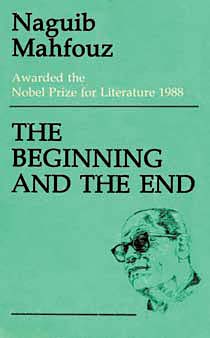NAGUIB Mahfouz had a great capacity for observation. He was a real genius. He was born in Cairo’s crowded Gamaliyya district, the son of a merchant. He became familiar with Eastern, Western and Arab traditions and philosophies and he enjoyed socializing with ordinary people. Not surprisingly, ordinary people are the main characters in his 30 novels, hundreds of short stories and plays. For most of his life, Mahfouz never left the old quarter of Cairo. His sharp observation of human life and human nature gave him a wonderful insight which he presents to his readers.
Mahfouz, who won the Nobel Prize for Literature in 1988, is a realist, one who calls a spade a spade. One cannot change the course of events that have already taken place but while describing them, one needs courage. In Mahfouz’s novels this courage is abundant. “The Beginning and the End” is a novel that portrays real conditions and challenges faced by the Egyptian middle class during World War II. The novel revolves around a middle class family whose sole bread winner dies suddenly. Three sons — Hassan, Hussein, Hassanein and a daughter Nefisa — are left fatherless and Samira, their mother, has no means of supporting them.
The oldest son, Hassan, leaves his studies and is sitting at home doing nothing. Later he joins the Egyptian mafia which adds to the woes of the unfortunate family. The other two sons, Hussein and Hassanein, try to support the family but are unable to do so. As events unfold misfortune dogs the family. Nefisa, the only daughter, stumbles on the path of life and is arrested in the house of a Greek woman who rents her house to lovers. Nefisa’s brother, Hassanein, is informed of what has happened and his heart is filled with shame and rage. His middle-class respectability compels him to force his sister to commit suicide and to save the honor of the family, Nefisa throws herself from a bridge over the Nile into the river.
After her tragic death, Hassanein comes to the same spot from where his sister had committed suicide and remembers her last words as well as his own conversation with her. Her words ring in his ears: “I don’t want any harm to come to you because of me. This is God’s will. Life is more dreadful than death.” He thinks about his meeting with the police officer and again thinks about his sister’s last words.
The novel ends with these words, “If this is what you want, so be it! I won’t scream. For once, let me be courageous. May God have mercy upon us.” Hassanein climbs the rail, throws himself into the Nile and dies.
The plot of the 379-page novel is not itself very big but the details of life and characters of Cairo’s old quarter during World War II make it very big. The dialogues and description of real economic conditions along with social problems enhance the value of this novel. It was translated by Ramses Awad, edited by Mason Rossiter Smith and published by The American University in Cairo Press.
Mahfouz discovered realism in the works of Huxley, Lawrence, Galsworthy and Flaubert and he was well versed in both Western and Russian literature. Arabic was his mother tongue and he was familiar with ancient and modern Arabic prose, poetry and philosophy. The realism is like a searchlight to him and helps him investigate and bring even the far-flung, hidden and forgotten corners and characters of society into light. This translation is so good that the reader forgets that he is reading a novel not written in English. Poverty, ardent ambitions, fancies, the mindset of a social class dealt with in this novel and the sense of a lack of security along with middle class respectability fills the pages of this novel. Every character of this novel not only talks but also sometimes screams and fills our hearts with sadness.


